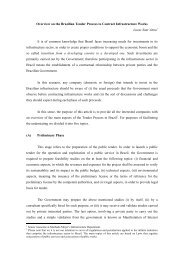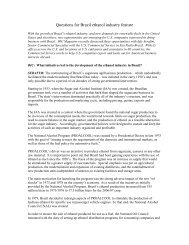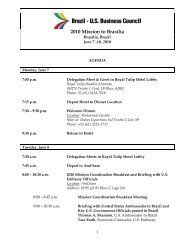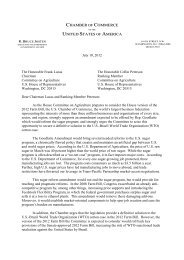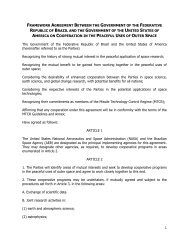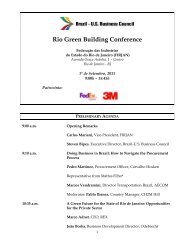Brazil's Tax and Trade Policies under the Rousseff - Brazil-US ...
Brazil's Tax and Trade Policies under the Rousseff - Brazil-US ...
Brazil's Tax and Trade Policies under the Rousseff - Brazil-US ...
- No tags were found...
Create successful ePaper yourself
Turn your PDF publications into a flip-book with our unique Google optimized e-Paper software.
<strong>Brazil</strong> - U.S. Business Council<strong>Brazil</strong>’s <strong>Tax</strong> <strong>and</strong> <strong>Trade</strong> <strong>Policies</strong> <strong>under</strong> <strong>the</strong> <strong>Rousseff</strong>AdministrationGlaucia Lauletta Frascino <strong>and</strong> Aless<strong>and</strong>ro Amadeu da FonsecaWashington, September, 2012
General Rules of Foreign Investments• Foreign investments are subject to registration before Central Bank of <strong>Brazil</strong> (“BACEN”),whe<strong>the</strong>r in <strong>the</strong> form of equity or debt•Exchange controls: <strong>Brazil</strong> has a system of exchange control in regard to <strong>the</strong> remittances offunds abroad, including capital injection, remittance of dividends, interest payments, funds fromimport <strong>and</strong> export operations, remittance of royalties <strong>and</strong> contracting services. This control isdone by BACEN.• Repatriation: <strong>the</strong>re is no minimum period for being in <strong>Brazil</strong> (<strong>the</strong>re may be specific tax for loanswith term of less than 90 days). The return of invested capital as a divestiture or dividends is free<strong>and</strong> exempt of taxes. Capital gains are taxed. Remittance of interest are subject to WithholdingIncome <strong>Tax</strong> <strong>and</strong> <strong>the</strong>ir remittance abroad also depends, in general, to previous registration beforeBACEN.
Limitations to Foreign Investment• Communication industry / media: newspapers <strong>and</strong> media companies (image <strong>and</strong> sound)must be controlled by <strong>Brazil</strong>ian individual ; foreign investment is limited to 30% of <strong>the</strong> totalvoting capital, this rule does not apply to Internet companies• Petroleum <strong>and</strong> nuclear energy: state monopoly, but <strong>the</strong> Government may authorize <strong>the</strong>exploration by state enterprises, mixed-capital or private companies• Health: restricted to national capital (although foreigners can participate in health insurancecompanies)• Mining: participation of foreign capital through <strong>Brazil</strong>ian companies is allowed. There aremore restrictions in border areas• Buildings: <strong>the</strong>re are restrictions only in border areas (including coastal zone), while<strong>Brazil</strong>ian companies with foreign capital may have properties in <strong>the</strong> coastal zone• Public Services: telecommunications, electricity, gas distribution, rail transport, amongo<strong>the</strong>rs, are explored through concessions <strong>and</strong> foreign participation is permitted <strong>under</strong>certain restrictions
Establishing a company in <strong>Brazil</strong>• Due to <strong>the</strong> difficulties of operating in <strong>Brazil</strong> through branches, <strong>the</strong> common way of doingbusiness in <strong>Brazil</strong> is through a <strong>Brazil</strong>ian company• Types of companies used: (a) limited partnership or (b) a corporation (which can access <strong>the</strong>capital markets through <strong>the</strong> issuance of shares <strong>and</strong> debentures). In both cases, <strong>the</strong> partners'liability is limited to <strong>the</strong> capital invested or committed to be invested• However, <strong>the</strong>re may be liabilities for tax or labor issues (except for strict liability of <strong>the</strong>controllers of financial institutions)• In general, administrators are personally liable only if <strong>the</strong>y acted in violation of law or <strong>the</strong>corporate bylaws. There are, however, specific hypo<strong>the</strong>ses of managers liability for issuessuch as violation of consumer rights or environmental <strong>and</strong> tax laws
Establishing a company in <strong>Brazil</strong>• To establish a company in <strong>Brazil</strong> is necessary:• Select at least two partners, both can be foreigners;• Select an address - some companies lease addresses to pre-operating companies;• Select an officer: (i) one officer for <strong>the</strong> limited; (ii) for corporations, <strong>the</strong>re must be two officers; (iii)in both cases, officers must be resident in <strong>Brazil</strong>;• Register <strong>the</strong> article of association/ corporate bylaws on <strong>the</strong> commercial registry of <strong>the</strong> State of <strong>the</strong>company's headquarters;• Incorporating a company in <strong>Brazil</strong> lasts approximately 20 days after received notorized <strong>and</strong>legalized foreign documents. Operating license may take more time depending on <strong>the</strong> activity;• Register before BACEN of <strong>the</strong> capital remitted to <strong>Brazil</strong> as equity or debt.
Associations / Joint Ventures• Joint ventures ("JV") are created in <strong>Brazil</strong> through <strong>the</strong> incorporation or acquisition of a localcompany, where partners negotiate a shareholders agreement, defining mutual rights <strong>and</strong>obligations• Typically, JVs are Limited Partnerships or Corporations• It must be provided:• The division of powers between <strong>the</strong> partners (who chooses <strong>the</strong> board members <strong>and</strong> directors<strong>and</strong> quorum determination of certain matters)• Withdrawal ("lock-up", "tag-along" <strong>and</strong> "drag along")• "dead-locks" solutions ("options", "shot-gun")• Non-competition clause <strong>and</strong> change of control• Solution dispute clause• Applicable law: may be foreign• Jurisdiction: arbitration or judicial
Acquisition of Equity Interest• Acquisition of <strong>the</strong> share control or minoritary interest in a <strong>Brazil</strong>ian company - basicdocuments: Confidentiality agreement Letter of intent or memor<strong>and</strong>um of <strong>under</strong>st<strong>and</strong>ing "Due diligence" contingencies <strong>and</strong> compensation (damages) Definitive Agreements: typically, <strong>the</strong> subscription or purchase agreements, <strong>and</strong> in case ofbuying less than 100%, shareholders' agreement. Regulatory approvals, when applicable (telecommunications, financial institutions, health, etc.) Previous communication to <strong>the</strong> competition authorities (Conselho Administrativo de DefesaEconomica - “CADE”) in case of <strong>the</strong> total revenues of <strong>the</strong> invested company is superior to R$ 30million or <strong>the</strong> total revenues of <strong>the</strong> investor company is superior to R$ 400 million
<strong>Brazil</strong>ian Corporate <strong>Tax</strong>ation<strong>Tax</strong>ation on Profits: Corporate Income <strong>Tax</strong> (“IRPJ”) <strong>and</strong> Social Contribution on net Profits(“CSLL”)• <strong>Brazil</strong>ian companies are subject to IRPJ, at <strong>the</strong> rate of 15% plus an additional rate of10% on any income exceeding R$ 240,000¹ on an annual basis or R$ 20,000 on amonthly basis, <strong>and</strong> CSLL, at <strong>the</strong> rate of 9%• Both IRPJ <strong>and</strong> CSLL are levied on <strong>the</strong> company’s profits, calculated in accordancewith: (i) <strong>the</strong> Real Profit Method (“RPM”) or (ii) <strong>the</strong> Presumed Profit Method (“PPM”)• The election of RPM or PPM is, as a rule, discretionary to <strong>the</strong> taxpayer. However,<strong>under</strong> <strong>Brazil</strong>ian tax legislation, <strong>the</strong> RPM is m<strong>and</strong>atory for companies: (i) whose totalannual revenue in <strong>the</strong> prior year exceeded R$ 48,000,000, (ii) that generate income orgains abroad, (iii) which are financial institutions, (iv) which are factoring companies, or(v) which are entitled to specific tax incentives <strong>and</strong> exemptions• Please note that <strong>the</strong>re is no specific rule for newly-incorporated companies in regard of<strong>the</strong> first requirement. In our <strong>under</strong>st<strong>and</strong>ing, once <strong>the</strong> requirements above are observed,<strong>the</strong> newly formed company may adopt whichever method that might bring tax efficiencyfor <strong>the</strong> business
<strong>Brazil</strong>ian Corporate <strong>Tax</strong>ationReal Profit• Under <strong>the</strong> Real Profit, <strong>the</strong> amount of IRPJ <strong>and</strong> CSLL is calculated on an annual orquarterly basis on net profits before taxes, adjusted by additions (taxable revenues)<strong>and</strong> exclusions (deductible expenses) authorized by <strong>the</strong> applicable tax legislation• <strong>Tax</strong> losses may be carried forward with no time limitation but <strong>the</strong>y may be used toreduce up to 30% of <strong>the</strong> taxable profit generated in a given yearPresumed Profit• Under <strong>the</strong> PPM, <strong>the</strong> amount of IRPJ <strong>and</strong> CSLL is calculated on a quarterly basis, overa profit margin calculated through <strong>the</strong> application of a certain percentage on <strong>the</strong> grossrevenue of <strong>the</strong> legal entity (<strong>the</strong> “presumed profit” margin)• Unlike <strong>the</strong> Real Profit, <strong>the</strong> Presumed Profit does not allow any kind of deduction <strong>and</strong>tax loss carry forward
<strong>Brazil</strong>ian Corporate <strong>Tax</strong>ation<strong>Tax</strong>ation on Revenues: PIS <strong>and</strong> COFINS• PIS <strong>and</strong> COFINS are levied on a monthly basis on <strong>the</strong> companies’ revenues calculated inaccordance with(i) a cumulative system at <strong>the</strong> rates of 0.65% (PIS) <strong>and</strong> 3% (regular rate of COFINS) or(ii) a non-cumulative system, at <strong>the</strong> rates of 1.65% (PIS) <strong>and</strong> 7.6% (COFINS), but <strong>the</strong>company is entitled to use PIS <strong>and</strong> COFINS credits with respect to certain costs <strong>and</strong>expenses authorized by law• Companies adopting Real Profit are subject to PIS <strong>and</strong> COFINS <strong>under</strong> <strong>the</strong> non-cumulativesystem whereas companies <strong>under</strong> <strong>the</strong> Presumed Profit are subject to PIS <strong>and</strong> COFINS <strong>under</strong><strong>the</strong> cumulative system• Revenues resulting from <strong>the</strong> sale of permanent assets are exempt from PIS <strong>and</strong> COFINS.Financial revenues generated by companies <strong>under</strong> <strong>the</strong> non-cumulative system are subject toa rate of zero, except for interest on net equity (juros sobre capital próprio)
<strong>Tax</strong>es on Company’s DistributionsDividends• The profits distributed as dividends, by <strong>Brazil</strong>ian resident legal entities to beneficiaries thatare resident in <strong>Brazil</strong> (corporations or individuals) or abroad, are currently not subject towithholding income tax in <strong>Brazil</strong>Interest on Net Equity (“INE”)• <strong>Brazil</strong>ian legislation permits a <strong>Brazil</strong>ian corporation to make distributions to shareholdersas INE <strong>and</strong> treats those payments as a tax deductible, if some requirements are met• For purposes of tax deduction, <strong>the</strong> payments of INE are limited to <strong>the</strong> daily pro ratavariation of <strong>the</strong> long term interest rate (TJLP), as determined by <strong>the</strong> Central Bank fromtime to time, over <strong>the</strong> net equity of <strong>the</strong> company• Also, for purposes of tax deductibility, <strong>the</strong> amount to be paid may not exceed <strong>the</strong> greaterof50% of net income (after CSLL but before taking into account IRPJ <strong>and</strong> <strong>the</strong>amounts of INE itself) related to <strong>the</strong> period in which <strong>the</strong> payment is made <strong>and</strong>50% of <strong>the</strong> sum of retained profits <strong>and</strong> profit reserves as of, as rule, <strong>the</strong> beginningof <strong>the</strong> calendar year in which <strong>the</strong> payment is made
<strong>Tax</strong>es on Company’s Distributions• INE (continuation)• Payment of INE whe<strong>the</strong>r to a <strong>Brazil</strong>ian resident or to a beneficiary located abroad issubject to withholding income tax in <strong>Brazil</strong> at <strong>the</strong> rate of 15%• If <strong>the</strong> beneficiary of <strong>the</strong> INE is located in a country or location that does not imposeincome tax or where <strong>the</strong> maximum income tax rate is lower than 20% or yet whereinternal legislation imposes restrictions on <strong>the</strong> disclosure of shareholdingcomposition or investment ownership (“Favorable <strong>Tax</strong> Jurisdiction”), <strong>the</strong> withholdingincome tax rate is increased to 25%
O<strong>the</strong>r <strong>Brazil</strong>ian <strong>Tax</strong> Considerations1. Capital Gains• As a rule, capital gains realized by non-<strong>Brazil</strong>ian residents upon <strong>the</strong> disposal of assetsare subject to income tax in <strong>Brazil</strong> at <strong>the</strong> rate of 15%, whe<strong>the</strong>r <strong>the</strong> disposal is made toa <strong>Brazil</strong>ian resident or to ano<strong>the</strong>r non-<strong>Brazil</strong>ian resident• The applicable rate is increased to 25% if <strong>the</strong> non-<strong>Brazil</strong>ian resident is located in aFavorable <strong>Tax</strong> Jurisdiction2. Income• As a rule, any income paid, credited, delivered, employed or remitted by a <strong>Brazil</strong>iansource to an individual or legal entity residing abroad is subject to withholding incometax <strong>and</strong>, depending on <strong>the</strong> nature of <strong>the</strong> transaction that generates said income, o<strong>the</strong>rtaxes may be applied (such as PIS <strong>and</strong> COFINS, <strong>Tax</strong> on Services – ISS <strong>and</strong>Contribution for Economic Domain Intervention – CIDE)
O<strong>the</strong>r <strong>Brazil</strong>ian <strong>Tax</strong> Considerations3. Foreign exchange transaction• The conversion of <strong>Brazil</strong>ian reais into foreign currency <strong>and</strong> <strong>the</strong> conversion of foreigncurrency into <strong>Brazil</strong>ian reais, may both be subject to <strong>the</strong> <strong>Tax</strong> on Foreign ExchangeTransaction (“IOF/Exchange”). Although for most foreign exchange transactions, <strong>the</strong>rate of IOF/Exchange is 0.38%, it may be increased, at any time, up to 25% (applicableonly for future transactions)
O<strong>the</strong>r <strong>Tax</strong>esO<strong>the</strong>r Federal <strong>Tax</strong>es• IPI: levied on finished goods (national <strong>and</strong> foreign finished goods)• II: levied on <strong>the</strong> importation of goods <strong>and</strong> collected at customs clearance• IOF: levied on financial transactions relating to currency exchange, loans, securities <strong>and</strong>insurance (IOF/Exchange, IOF/Credit <strong>and</strong> IOF/Securities)• CIDE: levied at a rate of 10% on any monthly amount paid, credit, delivered, utilized orremitted abroad, regarding license of use of technological knowledge <strong>and</strong> transfer oftechnology• INSS Social Security tax: levied on payroll <strong>and</strong> on remuneration to be paid, respectively,by employers <strong>and</strong> workers• PIS/COFINS-Import: generally levied on <strong>the</strong> entrance of foreign goods in <strong>the</strong> <strong>Brazil</strong>ianterritory on importation of services. Such contributions are due at <strong>the</strong> combined rate of9.25%. In certain cases, PIS-Import <strong>and</strong> COFINS-Import can generate credits in line with<strong>the</strong> non-cumulative system of PIS <strong>and</strong> COFINS
O<strong>the</strong>r <strong>Tax</strong>esState <strong>Tax</strong>esICMS VAT <strong>Tax</strong>: levied on sales of goods; inter-municipal <strong>and</strong> inter-state transportationservices; <strong>and</strong> communication services• IPVA: levied on <strong>the</strong> property of vehicles• ITCMD: levied on <strong>the</strong> value of goods <strong>and</strong> rights conveyed by donation (as a gift tax) orestate succession (as a death tax), at a rate to be determined by each <strong>Brazil</strong>ian stateMunicipal <strong>Tax</strong>es• ISS: levied on general services, which are not subject to ICMS taxation• IPTU: in general terms, it is levied in respect of <strong>the</strong> ownership, control or possession ofurban l<strong>and</strong> or buildings, based on <strong>the</strong> market value of such real estate• ITBI: levied on <strong>the</strong> sale, purchase or assignment of real estate or of rights related
<strong>Tax</strong> Incentives• REIDI – Special Regime with Incentives for Development of Infrastructure in <strong>Brazil</strong>(Transportation, port, energy, basic sanitation <strong>and</strong> irrigation )• REPORTO – <strong>Tax</strong> Regime with Incentives for Modernizing <strong>and</strong> Amplifying <strong>the</strong> PortStructure (Port)• Special Regime for Exporting <strong>and</strong> Importing Goods for Exploitation Researches of Oil <strong>and</strong>Gas Oil <strong>and</strong> Natural Gas (goods for exploitation researches)• REPENEC – Special Regime of Incentives for Development of Infrastructure in <strong>the</strong> OilIndustry located in North, Midwest <strong>and</strong> Nor<strong>the</strong>ast Regions (oil - regional infrastructure)• REPEX – Special Regime for Importing Crude Oil <strong>and</strong> Oil Products (Oil – Import)• RETAERO – Special Regime for <strong>Brazil</strong>ian Aeronautical (Aeronautical Industry)• RECOM – Special Regime for Building, Amplifying, Reforming or Modernizing SoccerFields (FIFA World Cup 2014)
For fur<strong>the</strong>r information:Glaucia Lauletta FrascinoAless<strong>and</strong>ro Amadeu da Fonsecaglaucia@mattosfilho.com.brafonseca@mattosfilho.com.br55 11 3147-7692 55 11 3147-2812São PauloAl. Joaquim Eugênio de Lima 44701403 001 São Paulo SP BrasilTel (55 11) 3147 7600Fax (55 11) 3147 7770BrasíliaSHS Q.6 Bloco C Cj A sala 190170322 915 Brasília DF BrasilTel (55 61) 3218 6000Fax (55 61) 3218 6090Rio de JaneiroAv. Presidente Wilson 231 Cj 403/40420030 021 Rio de Janeiro RJ BrasilTel (55 21) 3231 8200Fax (55 21) 2262 6675New York135 East 57th Street 12th FloorNew York, NY, <strong>US</strong>A 10022Tel (1 646) 695 1100Fax (1 646) 695 1110Rua Campo Verde 61 3º<strong>and</strong>ar01456 010 São Paulo SP BrasilTel (55 11) 3035 4050Fax (55 11) 3035 4067www.mattosfilho.com.br



